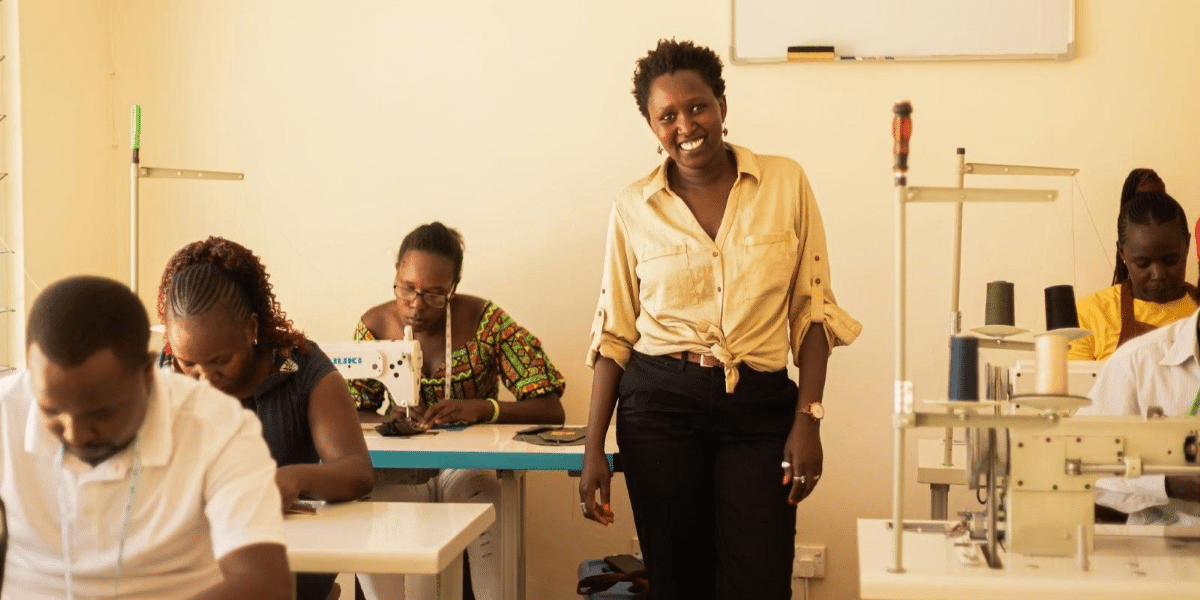By: Maria Williams
Ecodunia – founded by thought leader and entrepreneur Cera Muchiri – represents a necessary social shift towards ethically-enhanced business practices in the fashion and textile industries of the Global South. From implementing material changes to the infrastructure of workspaces to shedding light on new ways to approach global equity, Ecodunia seeks to dignify those working in the manufacturing and production industries of Kenya.
Whilst fair-trade regulations ensure worldwide consumers pay fair prices for goods, Ecodunia recognizes an often-neglected area of workspace inequality that can be lost in the murky waters of mass production and product fulfillment. Centered around the idea that Kenyan blue-collar workers are entitled to the same privileges seen in white-collar workplaces, Ecodunia seeks to implement honorable and dignified initiatives to serve those upholding the foundationary level of the production pyramid. Upon establishing its own fully functioning workspace in Nairobi, Kenya, Ecodunia aims all employees operate in a naturally lit environment with access to two meals a day and the aim of long-term financial security.
Conversely, around 80% of Kenyan workers in 2023 remained under the poverty line, implying that their incomes were insufficient to afford a decent living for themselves and their families. Aside from the direct concerns such conditions can cause for the average employee, this also inhibits them from breaking free from generational cycles of poverty. As charity initiatives enter the East African landscape, they seek to alleviate some of these pressing issues – however, without the implementation of long-term solutions, charity alone does little to make profound and lasting changes at a constitutional level. Cera Muchiri draws on her personal experiences growing up in the region, describing how the effects of accepting donations can diminish the empowering feeling of true autonomy. Hoping to grant financial security to more workers across the country, Cera Muchiri continues to provide life-changing opportunities to the Kenyan labor force – advocating the view that: “my community doesn’t need charity as much as it needs opportunity.”
As Ecodunia’s products reach the hands of its consumers, it encourages wearers to take pride in their purchases. Often, the transaction between the Kenyan laborer and the American consumer is seen as an unequal, charitable exchange. Rather than feeling as though they are simply helping Kenyan workers achieve a better life, Ecodunia gives their audience an opportunity, the opportunity of mutual reciprocation. “We provide world-class products that customers desire, it just so happens that you are also supporting a community on the other side of the globe.” This highlights that with a truly fair transaction the worldwide consumer can gain a sustainable, fashionable new accessory.
The social enterprise of Ecodunia perpetuates the idea that dignity is at the root of long-lasting economic stability. In their work to offer sustainable and comfortable working environments across Kenya, the business has seen fruitful results on the ground level. Since its inception in 2019, the organization has granted access to education and financial autonomy for its growing team of tailors and leathersmiths. Currently a team of twelve, each crafts-person in the Ecodunia workshop has three or more children with new-found access to schooling – granting the women a deserved sense of pride in providing for their children, without accepting handouts from others. The Ecodunia website states: “We foster sustainable opportunities for skill development and capacity-building – and then provide the opportunities to utilize these skills. Like Trevor Noah insightfully noted, teaching someone to fish is essential, but without a fishing rod, the lesson is insufficient. We hone the skills, provide the space to use them effectively and create a market for the goods. Together, let’s forge a path towards a more just and sustainable future for all.”
Published By: Aize Perez


















